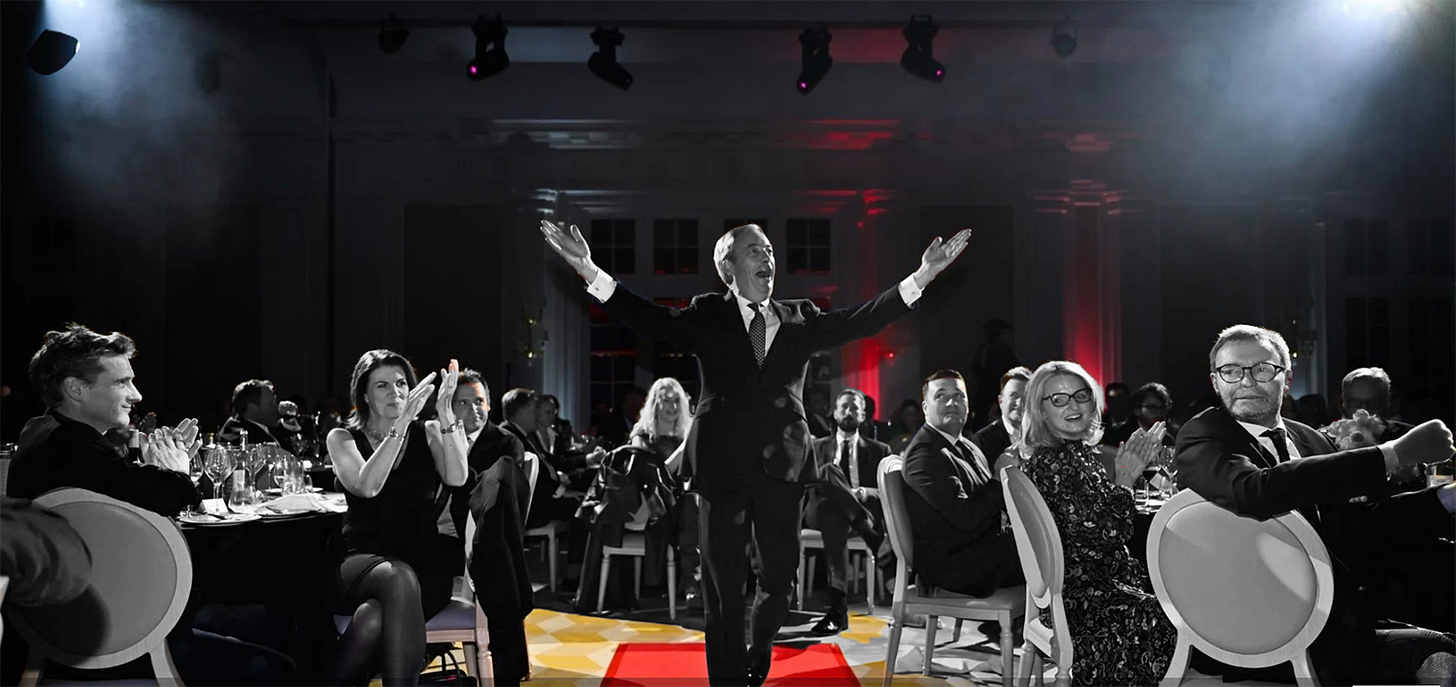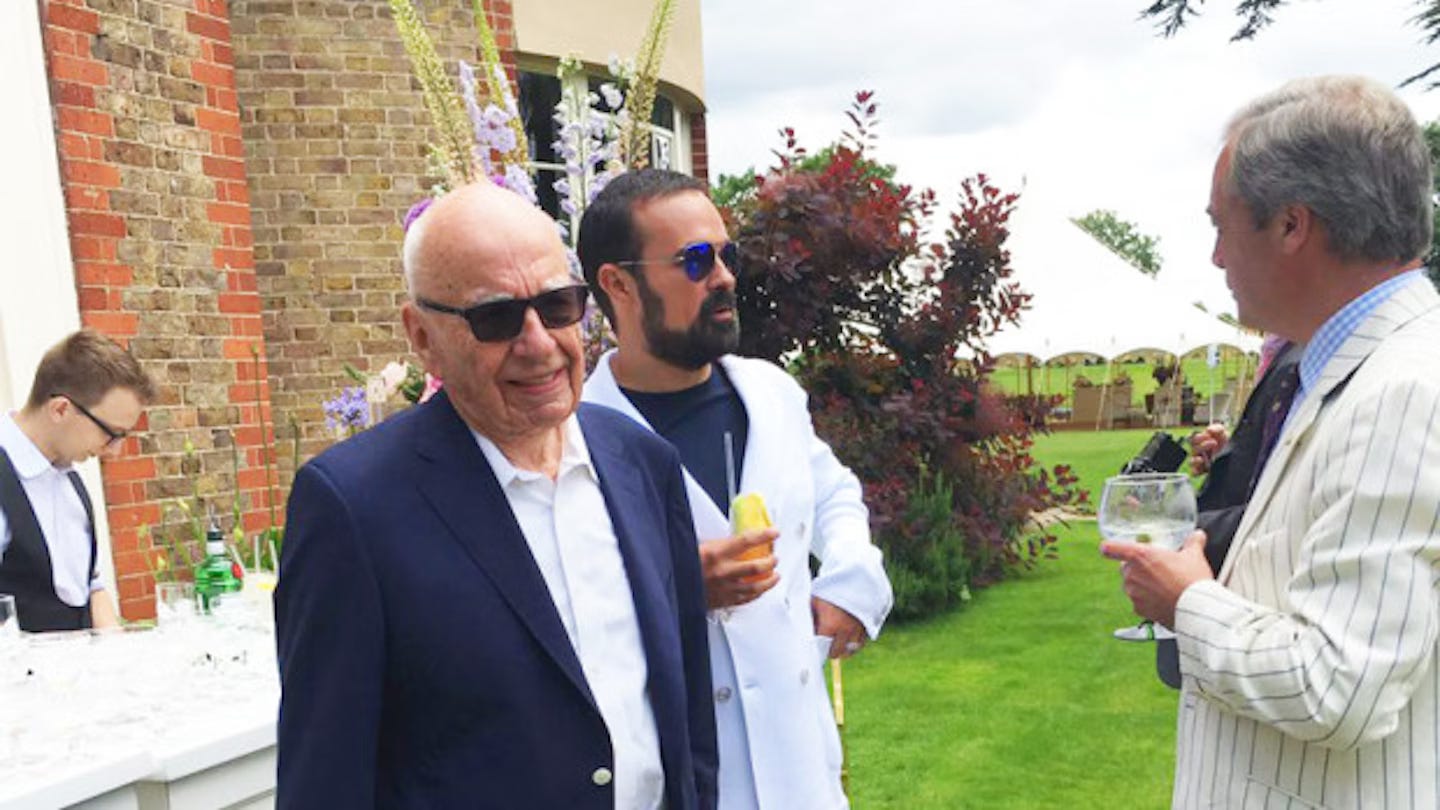Nigel Farage and the Rise of the ‘Anti-Establishment’ Establishment
By threatening nothing but the interests of the already-marginalised, the Reform leader has made himself the darling of the very establishment he claims to despise
A huge amount of time and effort is currently being expended to try and make the prospect of Nigel Farage becoming Prime Minister anything other than a ludicrous joke.
“Suddenly Reform is starting to look plausible” wrote Janice Turner in the Times this week, suggesting that the Reform leader’s focus on immigration means he now has an “electrifying USP”.
The fact that Farage has had this exact same “electrifying USP” for the past two decades and it has succeeded in winning him a grand total of five seats out of 650 in the House of Commons was not mentioned.
Neither is the fact that far from being a “unique” selling point, immigration is a subject that has absolutely dominated the political debate in Westminster for at least the last eight years.
The justification provided for this spout of Farage mania has been a poll out this week suggesting that Reform has replaced Labour in second place behind the Conservatives.
Of course what this coverage doesn’t dwell on is the fact that of the 25 UK voting intention polls that have been published since the general election, only one other survey has had Reform in anything other than third place.
However, while the current focus on the Reform leader may be capturing the most gullible parts of Fleet Street, it is not restricted to their pages, with even Keir Starmer’s own aides now starting to brief that they believe it may be Farage, rather than Kemi Badenoch, who could be their biggest rival at the next general election.
So why are we really hearing so much about the full-time GB News host and part-time politician?
The real answer to that question tells us an awful lot about how politics and media really works in the UK.
Telling Them What They Want to Hear
Nigel Farage has made much of his supposed status as an “anti-establishment” figure. At this week’s Spectator awards he goaded the audience of senior politicians and journalists for supposedly not wanting him to be there.
Yet in reality the Reform leader has long been a firm favourite of the very establishment that he claims to reject.
Born as the son of a stockbroker, Farage began his life as a pupil at the elite public school Dulwich College, before launching his own successful career in the City as a commodities trader.
When he finally did enter politics, it was not as part of a mission to tear down the establishment, but to glory in its perks. As a member of the European Parliament, Farage was repeatedly investigated over his use of expenses, with further funds coming from his multi-millionaire pal Aaron Banks. Indeed his attachment to Banks, just like his later attachment to the billionaire President Elect Donald Trump and his growing attachment to the richest man in the world, Elon Musk, was not the move of someone seeking to destroy the establishment, but was instead the sign of someone who wanted to climb on board.
It has been telling that one of the returning themes of Farage’s career has been his pleas to be made a “bridge” between Westminster and Trump as the UK’s ambassador to the US. Even now, with a Labour Government in power, the desire to be at the centre of power appears too strong for him to resist.
This has been reflected in his politics. Far from being focused on the establishment he claims to despise, Farage’s politics have always been dominated by attacks on the sort of people who are about as far from that establishment as it is possible to get.
Whether it’s desperate refugees fleeing war and persecution, or recent migrants struggling to make a life for themselves and their families in the UK, Farage has always opted to punch down, rather than up.
This choice has been the key to his success. Had he chosen instead to focus his “anti-establishment” politics on the actual establishment figures at the centres of British finance and media then it is highly unlikely that he would have been tolerated and even celebrated in the way that he has.
This is something that we can understand instinctively. There is a reason why Farage is such a regular feature on our TV screens, in a way that equally eloquent trade union leaders and left-wing firebrands simply aren’t, and it’s because unlike them, he is simply of no real threat to the interests and priorities of the people who own or run those outlets.
After all, when the billionaire owners of GB News hired Farage as a host it was not because they expected him to tear down the establishment, but because they wanted him to help put themselves firmly in the middle of it. It is telling that at this week’s Spectator Awards, the owner of the magazine seated himself next to a senior member of the current government, rather than next to the leader of the party seeking to replace it.
The rise of Farage is part of a much broader global trend in which the people who have the most power and money are rebranding themselves as part of a supposedly anti-establishment movement.
This can be seen most clearly in the rise of Elon Musk, who has used his own ‘anti-establishment’ credentials to secure a position for himself inside the government of the most powerful nation in the world. However, it can also be seen right across the globe, with authoritarian governments springing into power on the backs og anti-establishment campaigns, funded by some of the wealthiest people in the world.
Of course Paul Marshall is no Musk, just like Nigel Farage is no Trump. As with much of what passes for politics in modern Britain, we are now constantly being asked to swallow incredibly cut-priced, and watered-down versions of what has already happened on a much larger and more vivid scale in the United States.
Yet just as Trump’s rise was largely a creation of the very “fake news” media he claims to despise, so too is Farage being lifted up by a British press that is far more relaxed, and even excited, about the prospect of his potential rise to power than it it is letting on.
For all these reasons, as my colleague Hardeep Matharu wrote this week, Farage’s rise must be taken seriously, even if the claims now being made about his anti-establishment status are such an obvious confection.
And while that rise to the highest levels of power may be a much more distant prospect than the right-wing press is willing to admit, we must not rule out the prospect of the very establishment Farage claims to stand against, somehow conspiring to put him at its centre.






Brilliant piece. Astonished we have allowed the term "anti-establishment" to be freely applied to pro-big business far right parties everywhere. The Guardian used it in the context of the AfD the other day, whose policies would do nothing but enrich the already rich.
The majority of people do not see Farage the way the commentariat does but they need reminding of Farage’s self serving agenda.
As I see it, that requires a concerted effort on the doorstep. But before that, Starmer has to solve the comms problem that isn’t going away. Right now it feels like we’re being treated to a masterclass from an MBA course majoring in advanced PowerPoint.